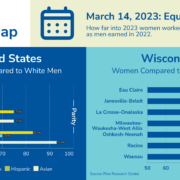Rising Popularity of CDFIs
How banks can grow their portfolio and assist communities in need
By Hannah Flanders
As the disbursement of wealth in the United States becomes increasingly polarized by the year, there is a growing need in neighborhoods throughout the country for new sources of capital and greater access to financing. To accommodate this need, Community Development Financial Institutions (CDFI) were developed to expand economic opportunity to low-income and low-wealth communities.
What is a CDFI?
A CDFI is a private financial, non-profit institution that often receives federal funding through the U.S. Department of the Treasury. Ranging from banks and credit unions to loan funds and venture capital providers, these institutions are CDFI certified for their efforts in empowering underserved communities.
With the help of the CDFI Fund, established by the Riegle Community Development and Regulatory Improvement Act of 1994, CDFIs specialize in lending to individuals, organizations, and businesses in under-resourced communities. In addition to low-interest rate loans, CDFIs have the ability to provide clients financial education and business coaching in specific aspects of our economy.
What Sets CDFIs Apart?
To become a CDFI, the financial institution must first be certified. Certification requires the institution to have a primary mission of promoting community development, principally serve one or more eligible target markets as well as be accountable to the target markets served, and to not be either a government entity or controlled by a government entity, among other conditions.
All CDFIs, with the assistance of federal funding and investments made for the purpose of community development, have the ability to take greater risk on lending to individuals, businesses, and communities that meet the CDFI’s specific funding source requirements. Because of this, CDFIs are able to expand the opportunities given to Native Americans, people of color, women, military-connected families, and many other underbanked individuals who may slip between the cracks of mainstream financial services.
CDFIs in Wisconsin
As of March 2022, there are 20 certified CDFIs in the state of Wisconsin, and throughout the U.S., CDFI institutions have increased by over 70% in the last 11 years to 1,395. In Wisconsin, CDFIs are represented by two banks (such as Bay Bank, Green Bay), one bank holding company (Bay Bancorporation, Green Bay), four credit unions, and 13 loan funds (such as Forward Community Investments, Inc., Madison). In addition, qualifying institutions may also be defined as either a venture capital (such as RFLF 2, LLC in Chicago, Ill.) or a depository institution holding company (such as American Bancorp of Illinois, Inc. in Oak Brook, Ill.). These 20 Wisconsin CDFIs play a critical role in establishing economic growth and opportunity for disadvantaged communities throughout the state.
Banks in Wisconsin eligible for certification are not only better suited in supporting underserved communities into mainstream banking, but also help grow their loan portfolio in their ability to serve all members of their community. Additionally, CDFI-certified banks are eligible for a range of program awards which assist in financing specific activities.
“With the recent health crisis, economic crisis, and social justice crisis there has never been a more needed time for quality loan programs to start and grow all businesses in Wisconsin, the U.S., and our world,” says Wendy Baumann, president and CEO of Wisconsin Women’s Business Initiative Corporation (WWBIC), a Wisconsin CDFI and WBA Associate Member aimed at assisting women, people of color, veterans, rural populations, and lower wealth individuals. “We need different lending institutions with different expertise and products to meet all the demands and foster a vibrant small business sector in both urban and rural communities.”
Working Alongside CDFIs
There are many other ways, besides becoming certified, that banks work in tandem with CDFIs. “Most [CDFI] clients are unable to meet the credit requirements of the commercial banks,” says Gary Mejchar, co-executive director/development at First American Capital Corporation (FACC), a WBA Associate Member and CDFI promoting economic development in Wisconsin’s Indian Country. “In turn, FACC welcomes referrals from banks for prospective borrowers not yet ready to meet the banks’ credit requirements.”
Additionally, working alongside CDFIs provides banks with the opportunity to enhance their Community Reinvestment Act (CRA) performance and become involved in new ways within their community. These activities include providing technical assistance, collaborating to invest in loan pools and consortiums, and providing funds for lending. For the full list of ways your bank can become more involved with CDFIs, visit fdic.gov/resources.
Establishing working relationships between banks and CDFIs is becoming increasingly critical to each institution’s ability to provide development opportunities to those who need it most. “CDFIs, SBA Microlender Program intermediary lenders, and banks are integral elements of the continuum of credit available to entrepreneurs, micro- and small-business owners in Wisconsin,” continues Mejchar. “In fact, a growing number of FACC borrowers are growing capacity, capital, and collateral to ‘graduate’ from our Native CDFI portfolio and qualify for forming business banking relationships statewide.”
In assisting local, Wisconsin CDFIs — or by becoming certified — banks allow themselves greater opportunity to commit to distinguishable change in underserved communities throughout Wisconsin. By increasing their ability to support low-income and low-wealth individuals, families, and businesses, banks across the state will help lead the way to sustainable, economic equality.
Wisconsin CDFIs
Institutions certified by the Treasury’s CDFI Fund:
- Bay Bancorporation* | baybankgb.com | 920-490-7600 (Green Bay Office)
- Bay Bank* | baybankgb.com | 920-490-7600 (Green Bay Office)
- Brewery Credit Union
- Columbia Savings and Loan Association* | columbiasavingsandloans.com | 414-374-0486
- Community Assets for People | capservices.org | 715-343-7500 (Portage County Office)
- CoVantage Credit Union
- First American Capital Corporation, Inc. | aiccw-facc.org | 414-604-2044
- First Nations Community Financial | firstnationsfinancial.org | 715-284-2470
- Forward Community Investments, Inc.* | forwardci.org | 866-687-1468
- Habitat for Humanity International, Inc. d/b/a Habitat for Humanity of Dane County | habitatdane.org | 608-255-1549
- Hmong Wisconsin Chamber of of Commerce | hmongchamber.org | 414-645-8828 (Milwaukee Satellite Office)
- Impact Seven, Inc.* | impactseven.org | 715-434-1717
- Legacy Redevelopment Corporation | lrcmke.com | 414-343-0163
- Milwaukee Economic Development Corporation* | medconline.com | 414-269-1440
- NiiJii Capital Partners, Inc. | niicap.org | 715-799-4806 (Business Center)
- Northwest Side Community Development Corporation | nwscdc.org | 414-444-8200
- Prime Financial Credit Union
- Royal Credit Union
- Wisconsin Native Loan Fund, Inc. | winlf.org | 715-588-1600
- Wisconsin Women’s Business Initiative Corporation (WWBIC)* | wwbic.com | 414-263-5450 (Milwaukee Office)
* Indicates WBA Membership or WBA Associate Membership










